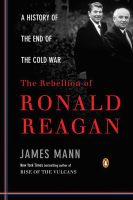In university, I once attended a panel discussion about the Cold War where one of the organizers of the large antinuclear demonstrations that took place in the Netherlands in the early 1980s startled the audience by saying he believed President Ronald Reagan had been a “nuclear pacifist.”
Many of the students, who had been taught Reagan was a cowboy, a radical rightwinger and a strident anti-communist who spoke of the Soviet Union as an “evil empire” just as Mikhail Gorbachev set about reforming the country, found the old peacenik’s admiration of the Republican president difficult to understand. Hadn’t Reagan stepped up the arms race, they asked? Wasn’t it his administration that deployed cruise missiles in Western Europe — the very missiles he protested against at the time?
The myth of Reagan the anti-communist who broke the back of the Soviet empire by outspending it in defense and pressuring it wherever he could endures not just on the left. Rather, it is the American right that perpetuates the myth most forcefully. They insist Reagan “defeated” the Soviet Union and are more likely to write Gorbachev out of the history of the end of the Cold War.
Yet the very conservative right that nowadays praises Reagan’s resolve for ending the Cold War was up in arms about what they saw as a conciliatory policy at the time, as James Mann is keen to point out in The Rebellion of Ronald Reagan: A History of the End of the Cold War (2009). Conservative columnists like Charles Krauthammer and George Will, lawmakers such as Newt Gingrich and Dan Quayle and The Wall Street Journal newspaper all opposed Reagan’s eagerness to sit down with Gorbachev and negotiate arms reductions. So did the very architects of détente, former president Richard Nixon and his chief diplomat, Henry Kissinger.
Nixon, Kissinger and the self-declared realists they represented were critical for a different reason, though.
The first group was disappointed in Reagan. They had elected an anti-communist who turned out to be far less confrontational than he let on. While Reagan never gave up his opposition to communism — he tried to make even Communist Party leader Gorbachev see the light — he was far more alarmed about the risk of nuclear war. When he saw a chance to reduce that risk, he took it — to the point where he talked about eliminating nuclear weapons altogether.
Reagan’s second group of conservative critics didn’t worry the president had lost sight of his principles. They complained he still clang to them too much. Reagan insisted on seeing the Cold War as a standoff between two competing ideologies. In such a struggle, one side, the side with the better ideas, would prevail. Nixon and Kissinger saw the Cold War was a geopolitical struggle. That is why they pursued détente at a time when Reagan, then the governor of California, argued communism must be defeated. For Nixon and Kissinger, there wasn’t that much point in defeating communism because the Soviet Union (or Russia) would endure.
Nixon and Kissinger might yet be vindicated. Russia has reemerged as a geopolitical competitor of the United States’. But their view was also a pessimistic one, one of perpetual Cold War. And one in which only a balance of terror of mutually assured destruction would keep the peace.
What the realists, including later defense secretary Robert Gates, the CIA’s top Soviet analyst at the time, failed to appreciate was Gorbachev’s sincerity. They saw him as a more charming and a more intelligent version of his predecessors, determined to expand Soviet power by deceiving the West. Reagan knew better. Unlike his critics, he had taken the measure of the man. Where his critics derided his “naivety” for believing Gorbachev was different, it was Reagan’s appreciation of the Soviet leader’s intentions (or his leap of faith, if you want to be less generous), not the armchair analysts’ naysaying, that provided the opening for real rapprochement.
“Reagan didn’t end the Cold War,” writes Mann; “Gorbachev abandoned it.” But how different things would have turned out if Reagan hadn’t recognized as much!
Mann’s careful retelling of the end of the Cold War is not only a powerful antidote to the triumphalist narrative of the American right then; it is also a necessary answer to the European left that tends to downplay Reagan’s significance. Any other Republican president would likely have mistrusted Gorbachev’s intentions and preferred the comfort of the Cold War, as it were, while a Democrat would probably have lacked the credibility to relax tensions and give Gorbachev the foreign-policy victories he needed to silence his critics at home. It was the coming together of these two men that broke the forty-year nuclear standoff.

